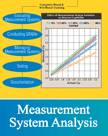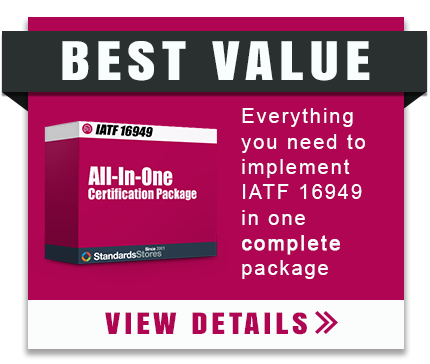Measurement System Analysis includes detailed tutorials on many measurement system analysis techniques including how to conduct and analyze GR&R (Gage Repeatability and Reproducibility) Studies. A GR&R is the accepted techniques for evaluating the level of variation in a measurement system and determining if the measurement system is acceptable for use. Measurement System Analysis covers techniques for analyzing the variation within a measurement system, determining its suitability for use, and ways to improve measurement systems. The GR&R analysis techniques used in MSA are in compliance with QS-9000/AIAG methods.
All courses also feature:
- Tracking of training including student test scores and bookmarks.
- Complete documentation for ISO 9001 (and other standards) required records.
- With our web-based training you can manage students for an entire corporation through one web-based account.
- Media-rich presentation including full audio and graphics.
- Exercises throughout to help reinforce learning.
- Solid technical content presented in an interesting and informative way.
- Complete student control to navigate through the program in a way that best meets the needs of the student.
- Certificates are awarded upon successful completion of courses providing documentation of Continuing Education Units that can be used for various professional certifications.
Course Objectives
- To explain various sources of measurement system uncertainty.
- To conduct measurement system studies including assessment of linearity, stability, repeatability, and reproducibility.
- To define ways to improve measurement systems.
- To understand and implement a gage management and calibration system.
Intended Audiance – Engineers, quality professionals, supervisors, metrology technicians
Approximate Time To Complete – 7 Hours
- 30 Days Access to Training
- 30 Days Extension available
- Study Guide in PDF Format
- Certificate of Completion
- CEU’s – (.7)
Course Outline
Unit 1 – Analyzing Measurement System Variation
- Lesson 1 Variation in Measurement Systems
- A review of sources of measurement system variation.
- An explanation of Type A and Type B evaluations of measurement uncertainty.
- Exploration of the effects of too much variation in measurements.
- Lesson 2 Measurement System Linearity
- How to measure gage/instrument linearity (both graphically and mathematically) to determine if a gage (or instrument) has linearity problems.
- Taking action to deal with linearity problems.
- Lesson 3 Measurement System Stability
- How to evaluate gage/instrument stability using a control chart.
- Taking action to deal with stability problems.
- Lesson 4 Repeatability & Reproducibility
- How to conduct a GR&R study.
- R&R analysis for non-destructive measurements.
- Use of ANOVA for GR&Rs
- R&R analysis for destructive measurements.
- R&R analysis for attribute measurements.
- Lesson 5 Improving Measurement Systems
- Using a problem-solving approach to find the root causes of repeatability and reproducibility problems.
- Using the GR&R data to help direct the problem-solving effort.
- A description of some basic causes to investigate if gage/instrument repeatability is high.
- A description of some basic causes to investigate if appraiser reproducibility is high.
- Lesson 6 MSA Software Considerations
- Suggested selection criteria of software features for a software program for analyzing GR&R studies.
- An overview of some of the advanced measurement system analysis tools that a GR&R software package may have.
- MSA Challenge
- An assessment of the learner’s progress in this unit.
Unit 2 – Managing Measurement Systems
- Lesson 1 Formalizing Management of Instruments
- Why a gage/instrument calibration program is so important and makes good business sense.
- Why a gage or instrument may not be accurate.
- The components of a gage/instrument management system.
- Lesson 2 Sources of Measurement Error
- Measurement errors due to gage/instrument calibration deficiencies.
- Measurement error related to gage/instrument usage or damage.
- Errors of judgment resulting in measurement errors.
- GR&R issues and measurement error.
- Lesson 3 Calibration Practices
- A discussion of common calibration practices.
- Key elements of a calibration system as defined by ISO 10012-1.
- Gage/instrument identification techniques.
- Sources for calibration procedures and independent calibration laboratories.
- Methods for determining intervals of calibration.
- Lesson 4 Calibration Standards & Tools
- Traceability of calibration standards from primary national standards to working standards.
- The role of transfer standards and working standards.
- Measurement uncertainty and the calibration system.
- Lesson 5 Calibration Pitfalls
- Common measurement equipment management system pitfalls.
- Proactive techniques to steer your organization clear of these pitfalls.
- Lesson 6 Records & Audits
- Different types of records needed for a comprehensive gage/instrument management system.
- The role of audits to ensure your gage management system is working.
- The elements of a corrective action plan to address areas of audit noncompliance.
- Lesson 7 Calibration Software Considerations
- Benefits of using gage management software.
- Suggested selection criteria of software features for a gage/instrument management software program.
- MSA Challenge
- An assessment of the learner’s progress in this unit.
Compare Products
| Individual Classes |
30 Day Extension |
|
|---|---|---|
| Number of Classes | 1 | 1 |
| Price/Class | $89.00 | $49.00 |
| Number of Days | 30 | Additional 30 |
| Total Price: | $89.00 Order Now! |
$49.00 Order Now! |




